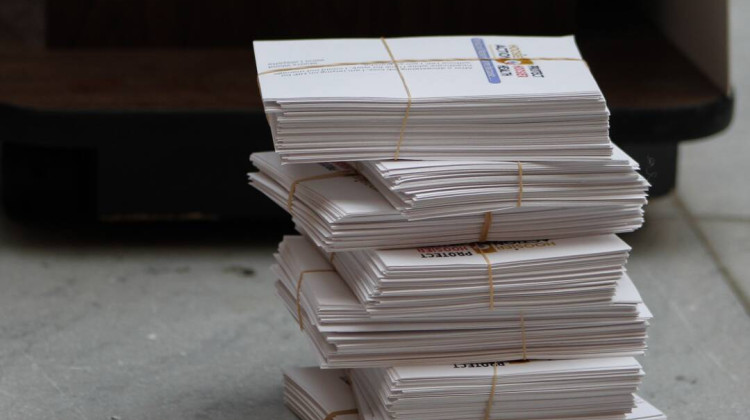
Housing advocates fear that people who lose their homes will crowd in with friends or relatives -- helping COVID-19 to spread.
FlickrWhen the COVID shutdown hit, lots of people lost jobs and couldn’t pay their rent. States and cities responded by putting a moratorium on evictions, but those are ending. Housing advocates are now bracing for a flood of evictions — and a public health problem.
The Arlington Woods neighborhood sits on the eastside of Indianapolis. It’s an older, predominantly black community of small ranch homes and apartment buildings. This year it has been a hot spot for COVID-19.
And now, it’s likely to face another crisis. Since Indiana’s moratorium ended on August 14, thousands of eviction notices have been sent. Housing advocates expect Arlington Woods will be hit hard.
Andrew Bradley is the policy director at Prosperity Indiana, a community economic development organization.
“Our partners with the Hoosier Housing Needs Coalition have predicted multiple waves of evictions as the first one starting just as soon as the moratorium is lifted,” Bradley says. “There may be some landlords who are frankly, you know, fed up and feel like they want to file that eviction right away.”
Bradley predicts a second wave of evictions when rental assistance funds run out and a third in 2021.
A report from the National Low Income Housing Coalition says more than 300,000 households in Indiana are at risk of eviction due to COVID-19 alone. In comparison, there were just over 27,000 evictions in 2016.
“And unless there's any new emergency rental assistance appropriated and then those folks all could really have nothing to fall back on,” Bradley says.
Amy Nelson is the director of the Fair Housing Center of Central Indiana. She says the pandemic has emphasized how interconnected health and housing are— especially for those at high risk for COVID-19. And many people of color have health conditions that can make a COVID case worse.
“Poor neighborhoods, neighborhoods of color, have higher rates of asthma and blood pressure, which of course are all health issues that the COVID pandemic is then being impacted by,” Nelson says.
Dee Ross says the evictions also could trigger a larger public health problem. As people lose their homes, they may have to stay with friends or relatives until they can find another place of their own.
“It will increase the number of interactions with different people that is not usually in your same household,” Ross says.
Ross is the founder of the Indianapolis Tenants Rights Union. The organization goes door to door to help renters understand their legal rights. They also can help out in court on eviction cases.
He says a global pandemic is not the time for people to be unhoused.
“This deadly virus that is killing people disproportionately in black and brown communities at alarming rates than any other race, and disproportionately black and brown people are the ones being evicted at the highest rate in Indiana,” Ross says.
According to a new study from the New America, the rush of evictions in August is not unusual in Indianapolis. The organization looked at data from 2014 to 2018 and found that August evictions in the city were up to 50 percent higher than other months.
Bradley agrees that evictions can cause special problems this year.
“And that's where that couch surfing issue comes up people going from place to place every few nights, not trying to burden anybody in particular, but possibly at risk of spreading around the risk of coronavirus,” Bradley says.
Bradley, Nelson and Ross are all part of the Hoosier Housing Needs Coalition. As they prepare for the evictions, they are lobbying for policy changes, pushing for additional funds and educating tenants.
Government programs offer financial help to people who can’t pay rent due to COVID-19 related income loss. But Bradley says a lot of people were unaware of them.
“We're not confident that the people who need the help most even know about the program, that there's been enough proactive outreach to get to the households that are most impacted,” Bradley says. “And in many cases, those are not only low-income renters, but they are African American and Latino communities.”
More than 30,000 people applied for the state’s program, but it shut down less than two weeks after the moratorium was lifted. Marion County has a separate program, but it cut off applications in just three days, and there are about 25,000 people on the waiting list.
Bradley is unsure if program funds will even be enough.
“But we haven't yet even seen enough resources for the folks who have already signed up,” Bradley says.
Ross says everyone, from politicians to advocates to community members, has a role to play in addressing housing loss.
“What kind of collected plans can we put together now that can take off the load and distress in our communities?” Ross says.
He says it’s time to get ahead of the issue, because the coronavirus is not going away.
This story was produced by Side Effects Public Media, a news collaborative covering public health.
 DONATE
DONATE






 Support WFYI. We can't do it without you.
Support WFYI. We can't do it without you.